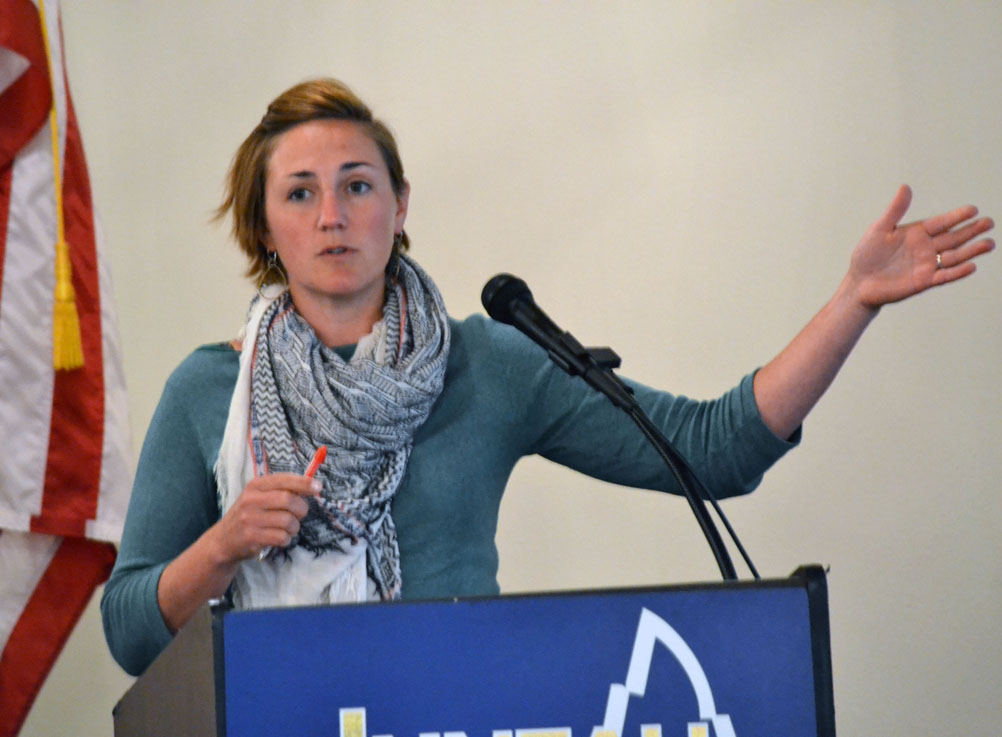Two people have been working to reduce the carbon footprints of several communities in Southeast Alaska. They’re hoping that Juneau will be the next community to get involved in their emission-mitigation mission.
Speaking at the Juneau Chamber of Commerce’s weekly luncheon Thursday, Robert Venables and Shaina Kilcoyne pitched the Southeast Energy Audit Program. During the past year, the two helped audit 34 buildings in four different Southeast communities.
They found that with about $380,000 worth of energy-efficiency upgrades, the communities they visited could save nearly $170,000 combined. If businesses make the recommended changes, they’d be able to cover the cost of the efficiency upgrades with about two and a half years, Venables and Kilcoyne said.
“In communities where there isn’t much employment and not much business, businesses may be able to hire a new employee or stay open longer each year with these savings,” Venables told the Empire after his presentation to the chamber. “In smaller communities, this could make the difference between them staying in business or not.”
Though Venables and Kilcoyne have been working together on the energy audit project for the past year, they aren’t actually coworkers. Venables is the energy coordinator for Southeast Conference. Kilcoyne serves as the energy efficiency director for the Renewable Energy Alaska Project.
The two met last summer at an energy-efficiency workshop last summer, where they heard that the U.S. Department of Agriculture was subsidizing energy audits. That’s when Venables and Kilcoyne decided to bring an auditor to Southeast Alaska.
“We’re just helping businesses identify where the savings might be, and we were trying to figure out how we can then move buildings to the next step,” Kilcoyne said. “Now, we want to open it up to all the other communities that haven’t had this opportunity.”
Energy costs less in Juneau than in many other Alaskan communities — including the other Southeast towns that Venables and Kilcoyne have already visited. The low cost of energy, relatively speaking, in Juneau has “lowered the energy angst here,” Venables said, but he and Kilcoyne still wants to include the capital city in their auditing program.
In 2010, the Juneau Climate Action Plan recommended that the city reduce green house gas emissions 25 percent by 2023. In order to do that, the city is going to have to do something about its inefficient buildings, which consume 40 percent of all energy used in Juneau, according to the climate plan.
That figure is particularly troubling as far as emissions are concerned because most Juneau buildings are heating using nonrenewable energy sources, namely heating oil. And if Juneau is going to keep using oil to stay warm, it might as well make sure its doing so efficiently, according to Venables.
In order to make it cost effective to fly their auditor down from Anchorage, Venables and Kilcoyne said they’ll need at least four businesses in Juneau to sign up for audits, but the more the better.
Audit prices vary depending on the size of buildings, but range from $150 for a 3,000 square-foot building to $300 for a 10,000 square-foot building. Anything building larger than that requires custom pricing.
To apply for an audit, visit energy@seconference.org. But be warned, the audit process has been known to make people hyper sensitive to wasteful energy practices. At least that’s the ongoing joke between Venables and Kilcoyne.
“After our first week of audits, I was dreaming about walking through inefficient buildings,” Kilcoyne said.
“We walk into places and still see incandescent bulbs,” Venables added with a laugh. “I get the baseball bat out when I see those bulbs.”
It’s a good thing he left the bat at home on Thursday because the dining hall of the Moose Lodge, the venue of the chamber’s weekly luncheons, is lit by several chandeliers containing more than 100 incandescent light bulbs.
• Contact reporter Sam DeGrave at 523-2279 or sam.degrave@juneauempire.com.
Read more news:
Down in the dumps: Airport closes lavatory dumpsite after surprise FDA inspection
Derby dynasties shoot for third crown
Anchorage lawmaker says lawsuit “highly likely” if PFD not restored

